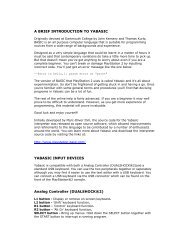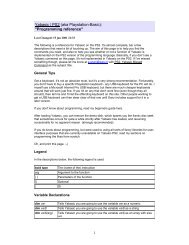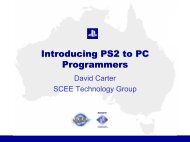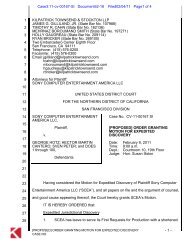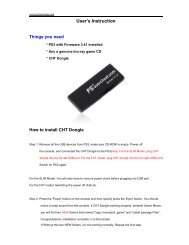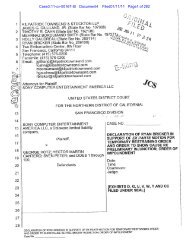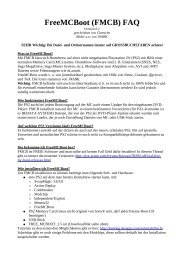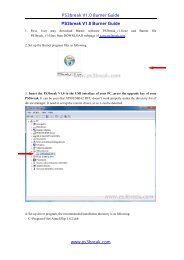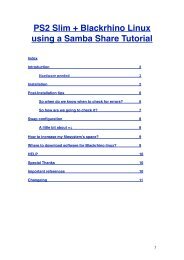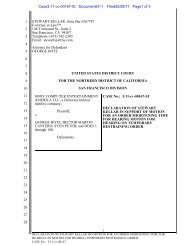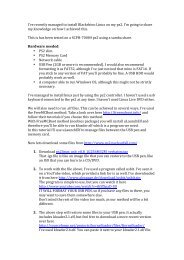You also want an ePaper? Increase the reach of your titles
YUMPU automatically turns print PDFs into web optimized ePapers that Google loves.
1/10/2011 Slashdot bushing (11)<br />
(tl;dr: yes, you're right, and that's more or less what we're doing. Haven't decided on which PHY to use, looking at some SMSC and NXP parts.)<br />
OpenVizsla will be a completely open design of a device that can capture USB 1.1/2.0 (high-speed, full-speed and low-speed) traffic passively between a target USB<br />
device and the connected host (usually a PC, but potentially anything that has a USB host port -- think Xbox 360 and PS3). It will be controlled by any computer using<br />
open-source client software or potentially in standalone mode (where captured traffic is stored onto an on-board SD card).<br />
As is proper for any open and hackable design, unused I/Os on the FPGA will be exposed (via 0.1" header) for use as a primitive logic analyzer. We hope to eventually<br />
support additional sniffing interfaces (SPI, I2C RS232, SD card etc) that connect to a high-speed Mictor connector that can act as 'man-in-the-middle' and extend the<br />
device capability limitlessly.<br />
The OpenVizsla device is built around a multi-layer PCB with around 180 surface-mount components that allow the target USB packets to be captured, buffered and<br />
delivered to the PC (or stored on SD card in standalone mode).<br />
An XMOS event-driven processor will handle the huge amount of USB data (these little chips are fast!) and it will handle the overall communications with the host<br />
(which will be a fully published protocol!) and will provide on-board system programming, housekeeping and of course flash the status LEDs! In standalone mode, the<br />
XMOS chip will handle data acquisition and SD card storage; this processor is fully reconfigurable and can be modified and reprogrammed to improve the features or<br />
adapt to new requirements.<br />
For the high-speed USB signals a Xilinx Spartan3E FPGA (with attached, expandable RAM) will capture, process and buffer the USB traffic from an attached USB<br />
transceiver that we use to deserialize the USB signals from the target link.<br />
Stephen Fry and DVD Jon back USB Sniffer Project-> Anonymous Coward<br />
Submitted by Anonymous Coward on Friday November 26, @03:52AM<br />
An anonymous reader writes<br />
"bushing and pytey of the iPhone DevTeam and Team Twiizers have created a Kickstarter project to fund the build of an open-source/open-hardware highspeed<br />
USB protocol analyzer. The board features a high-speed USB 2.0 sniffer that will help with the reverse engineering of proprietary USB hardware, the<br />
project has gained the backing from two high-profile individuals Jon Lech Johansen (DVD Jon) and Actor and Comedian Stephen Fry"<br />
Link to Original Source<br />
The Openvizsla USB sniffer board-> godofpumpkins<br />
Submitted by godofpumpkins on Tuesday November 23, @07:06PM<br />
godofpumpkins writes<br />
"bushing and pytey of the iPhone DevTeam have started a kickstarter project to fund the build of a open-source/open-hardware high-speed USB protocol<br />
analyzer. The board features a high-speed USB 2.0 sniffer that will help with the reverse engineering of proprietary USB hardware."<br />
Link to Original Source<br />
Apple: Old Apple 1 Up For Auction, Expected To Go For $160,000+<br />
h<br />
h Comments: 1<br />
Comments: 156<br />
Posted by Soulskill on Friday November 12, @02:48PM<br />
from the doesn't-run-flash dept.<br />
vanstinator was one of several readers to point out that Christie's is holding an auction for one of the original Apple 1 machines, complete with a manual, the original shipping<br />
box, and the letter from Steve Jobs to the owner. The invoice says the computer was purchased on December 7th, 1976, with an Apple cassette interface card, for a total price of<br />
$741.66. The auction house expects it to sell for over $160,000.<br />
Comment: Re:Well, is this a good thing? (Score 2, Interesting)<br />
by bushing on Sunday September 19, @09:50PM (#33631906)<br />
Attached to: Emulation Arrives On the PS3<br />
Case3:11-cv-00167-SI Document4 Filed01/11/11 Page278 of 282<br />
November 2010<br />
September 2010<br />
Comments: 169<br />
Yup, similarly to the DS homebrew scene. IIRC the libdns homebrew library had parts which were ripped of the original nintendo SDK... of course people just turned a blind eye on<br />
that<br />
It's a subject of some debate. The Xbox homebrew scene, as I understand it, used files directly copied from a leaked Xbox SDK. libnds uses some code that is more or less directly<br />
translated from disassembled DS SDK code (though you can get most of the same code from dumped games anyway); some feel that this is morally / legally equivalent to just copying<br />
the files.<br />
http://slashdot.org/~bushing 3/4<br />
a



